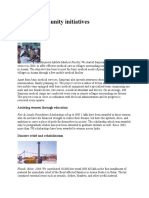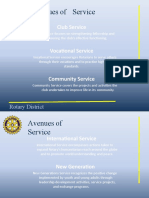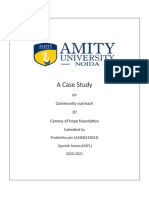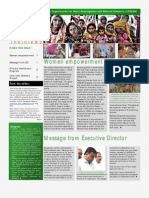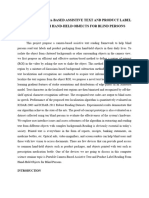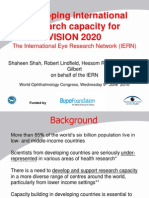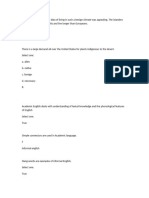IRP Snapshot
IRP Snapshot
Uploaded by
Abdullah ManCopyright:
Available Formats
IRP Snapshot
IRP Snapshot
Uploaded by
Abdullah ManOriginal Description:
Copyright
Available Formats
Share this document
Did you find this document useful?
Is this content inappropriate?
Copyright:
Available Formats
IRP Snapshot
IRP Snapshot
Uploaded by
Abdullah ManCopyright:
Available Formats
For further information , Please Contact:
Country Office
Islamic Relief Pakistan
Plot # 2, St # 7, G-10/2, Islamabad
Tel: +92 51 2114212-17
Fax: +92 51 2114170
E-mail: info@irp.org.pk
Website: www.islamic-relief.org.pk Pakistan Snapshot
All photos used in this booklet are copyright of Islamic Relief Pakistan (IRP).
Photos & Text: Muhammad Haseeb Khalid
Promote integrated development and environmental custodianship with a focus on sustainable
livelihoods.
Support the marginalised and vulnerable to voice their needs and address root causes of poverty.
Allocate these resources regardless of race, political affiliation, gender or belief, and without
expecting anything in return.
Our Values
We remain guided by the timeless values and teachings provided by the revelations contained within
the Qur'an and the prophetic example, most specifically:
Sincerity Ikhlas
In responding to poverty and suffering our efforts are driven by sincerity to Allah and the need to
fulfill our obligations to humanity.
Excellence Ihsan
Our actions in tackling poverty are marked by excellence in our operations and conduct which are
deserving of the people we serve.
Compassion Rahma
We believe the protection and wellbeing of every life is of paramount importance and we shall join
with other humanitarian actors to act as one in responding to suffering brought by disasters, poverty
and injustice.
Social Justice Adl
Our work is founded on enabling people and institutions to fulfill the rights of the poor and
vulnerable. We work to empower the dispossessed towards realizing their God-given human
potential and developing their capabilities and resources.
About Islamic Relief
Islamic Relief Worldwide (IRW) is an international relief and development charity which envisages a
caring world where people unite to respond to the suffering of others, empowering them to fulfill
their potential. We are an independent Non-Governmental Organisation (NGO) founded in the UK in
1984. We provide help where it is needed most and whenever we are best placed to assist.
Responding to disasters and emergencies, Islamic Relief promotes sustainable economic and social
development by working with local communities - regardless of race, religion or gender. Islamic
Relief currently has development programmes in more than 33 countries in Africa, Asia, Middle East
and Eastern Europe. Islamic Relief works in six main sectors: sustainable livelihoods, education,
health and nutrition, child welfare, water and sanitation, emergency relief and disaster
preparedness.
Islamic Relief has a consultative status (special category) with the economic and social council of the
United Nations, is a full member of British Overseas NGOs for development (BOND), is a member of
the UK platform of the liaison Committee of Development NGOs to the European Union, and is a
signatory of the Code of Conduct for the International Red Cross and Red Crescent Movements,
NGOs in Disaster Relief and People in Aid.
Our Vision
Inspired by our Islamic faith and guided by our values, we envisage a caring world where
communities are empowered, social obligations are fulfilled and people respond as one to the
suffering of others.
Our Mission
Exemplifying our Islamic values, we will mobilize resources, build partnerships, and develop local
capacity, as we work to:
Enable communities to mitigate the effect of disasters, prepare for their occurrence and respond by
providing relief, protection and recovery.
01 02
Custodianship Amana
We uphold our duty of custodianship over the earth, its resources and the trust people place in us as
humanitarian and development practitioners to be transparent and accountable.
Our Work in Pakistan
Islamic Relief commenced its operations in Pakistan in 1992, and secured a registration with the
Security and Exchange Commission of Pakistan in 1994 as a company limited by guarantee. Islamic
Relief is also registered with the Ministry of Finance. IR in Pakistan is focusing on the following
sectors:
Sustainable Livelihoods
Health
Water & Sanitation
Islamic Microfinance
Orphan Sponsorship
Emergency Response
Disaster Risk Reduction
Seasonal Programmes
Our Operational Areas
03
Sustainable Livelihoods
Breaking vicious cycle of poverty
A sustainable livelihood is a way of earning a living that empowers
people to become self-sufficient and less reliant on humanitarian
aid. Islamic Relief works closely with communities to identify
their needs and provide relevant livelihoods with training and
tool kits. Our livelihood projects include cash-for-work schemes
and developing small businesses.
Currently with support from its donors, Islamic Relief supports
farmers both the men and women about effective farming
methods. Islamic Relief distributed seeds and fertilizers among
the flood-hit farmers and provided training to improve their
livelihoods across Pakistan and AJK. Besides imparting vocational
training, IRP providing tool kits to women entrepreneur make
them self-sufficient.
Farmers get agricultural support and have been able to plough
their field which contributes to address food security and
contributing to strengthen local economy. Abdul Khaliq, one of IR
beneficiaries picture here got sunflower seeds and fertilizers
from Islamic Relief in a village Adam Malah, district Thatta.
All our belongings washed away by constant flooding and we
had no other option to left but to depend on aid. Islamic Relief
constantly worked in our villages. They provided us with food,
shelter, water and now they have imparted vocational training to
villagers. Farmers of my village were given seeds and fertilizers
and now able to plough their barren lands. An illiterate person
like me could not explain what this organisation has done to us to
build us back. I can only say thanks.
06
Islamic Microfinance
Making people self-sufficient
We are determined to help vulnerable people , making them self-
sufficient and contributing to end their dependency on aid.
That's why we are running an Islamic Microfinance Programme in
Pakistan to empower people in the poorest communities, so
they can earn a decent living and make themselves self-sufficient.
Our Islamic Microfinance Programme is designed to give people
the skills and support to lift them out of poverty and enter the
world of work. Our Microfinance Programme helps to mitigate
the chances of debt and helps to create and multiply
employment opportunities like Muhammad Younus pictured
here.
Islamic Relief Pakistan (IRP) launched its Microfinance
Programme (MFP) in 2001. Initially, the programme was aimed at
supporting widows and guardians of orphans by providing small
loans through Islamic financing methods but since 2002, the
focus was broadened to include all poor people. This programme
enables the participants to increase their entrepreneurial skills
while also meeting their needs for better food, health, education,
clothing and shelter. Since inception, the MFP has disbursed
more than 7,000 loans in marginalized communities for various
purposes including social development.
The programme includes the following key components:
1. Financial support
2. Business start-up grants
3. Vocational training
4. Enterprise development training
5. Exhibitions
07
Water & Sanitation
Water at doorstep
Water is essential for life. Yet more than 1.1 billion people have
no access to clean water. For some countries the problem is
scarcity of water, whilst in others it is the quality of water.
Unclean water can be fatal as it spreads diseases and illnesses
such as cholera and diarrhoea. Poor hygiene practices and access
to latrines also increases risk of disease. Over a third of the
world's population does not have access to adequate sanitation.
Islamic Relief aims to give people all over the world water for life.
We don't just hand out water to those who are thirsty we dig
wells, and build systems to collect and purify rainwater, helping
communities to access clean water. Islamic Relief's water and
sanitation projects include digging wells, building water supply
systems, rainwater-harvesting, constructing latrines and
providing basic hygiene training.
For many of the women in Dhir Kot district Bagh in AJK, their lives
used to revolve around getting water for their families.
Due to the distance of our water source, we were facing a lot of
problems in fetching water, said Ajeeba Begum. Sometimes we
spent the whole day waiting for our turn to fetch water. It was a
hectic routine and caused a lot of difficulty at times.
Islamic Relief provided us with a drinking water supply system.
The residents can now use the water for drinking and other
domestic purposes. The impact has greatly affected our lives. All
the households are benefiting from this water supply scheme.
Due to availability of clean drinking water, the health and hygiene
conditions in the area have improved.
With the extra time on our hands and water at doorstep, many of
the women are planning gardens to supplement their families'
diet and their income. Girls who used to fetch water from far
flung areas are now focusing on their studies, said Ajeeba.
10
Health & Nutrition
Serving the ailing
Providing access to healthcare and medication is fundamental in
the fight against poverty. Islamic Relief's health and nutrition
programmes include building, equipping and running healthcare
centres, training midwives and traditional birth attendants,
providing medication and carrying out health and hygiene
training.
Currently we are providing assistance to internally displaced
persons (IDPs) in KP with a special focus on the health of mother
and child.
Our elimination of blindness project in Balochistan and SEHAT
Project in Rawalpindi are helping to serve the ailing.
Islamic Relief Pakistan is involved in:
Mother and child health care programmes
Construction and rehabilitation of medical clinics
Running of BHUs
Distribution of medical equipment to hospitals
Food for malnourished children
Immunisation and health check-ups
11
Elimination of Avoidable
Blindness
Spreading colours of life
Islamic Relief is working in Balochistan to eliminate avoidable
blindness. The key objective of prevention of blindness was to
reduce the causes of avoidable blindness in child and adults, such as
cataract, refractive errors, low vision, trachoma, onchocerciasis,
and Vitamin-A deficiency and other causes.
Islamic Relief focused on efforts to address avoidable blindness by
preventive and curative interventions. Our team conducts OPD and
surgeries in EAB Hospital, eye surgical camps and school &
community eye screening camps and so far benefited over 12,000
people in Chagai and neighboring District Washuk.
IR intervention not only benefited the communities of Chagai and
neighboring districts, people from adjacent areas of Iran and
Afghanistan have been benefited as well. In additions Afghan
Refugees living in refugee camps in district Chagai get benefit of
EAB Hospital. Being the only hospital of Chagai and adjacent
districts it is playing a vital role in Vision 2020: The Right to Sight.
Photo shown here is of IR hospital in Chagai where 40-60 patients
get eye treatment on daily basis.
14
Orphan Sponsorship
Boosting self-esteem
Total Sponsored Children: 3,703
Girls: 54% Boys: 46%
Islamic Relief believes that talent and virtue should be nurtured
in all children regardless of wealth or privileges at birth. All
children have the right to be clothed, fed, protected and
educated. Our Child Welfare Programme (CWP) ensures
orphaned children and their families have access to food,
clothing, education, healthcare and shelter. We also help keep
families together by providing support to widows.
The Child Welfare Programme is carrying out One-to-One orphan
sponsorship in Pakistan and Azad Jammu Kashmir (AJK) where
the poorest families are targeted and financially supported in
meeting their basic necessities of life.
We ensure that our sponsored children have the same
opportunities as ordinary children and comprehensive support is
provided for future active citizens of society.
Bilal Butt, one of IR sponsored children showcased here reads in
Grade 6th. From last four years IR has taken him under it one-to-
one sponsorship programme. Bilal wants to be an engineer. I
enjoy my studies at school and play with my friends. I with my
mother and elder brother live in a one-room house. One day, I will
build a big house for my mother, Bilal vows.
15
Ramadan Programme
Sharing the Barakah
The Ramadan Programme is a seasonal project of Islamic Relief
which addresses food insecurity and eases the economic
burdens of the poor during the holy month.
Our Ramadan foods packs are designed, as per the international
standards for nutrition, to meet the needs of a family of seven or
eight members for the whole month of Ramadan.
Before distributing these food packs, Islamic Relief Pakistan in
collaboration with village committees, selects families who are
the most vulnerable and in need including female-headed
households, people with disabilities and families consisting of
orphans.
During the festive month, IRP ensures that its elected families
recieve five or more basic items in line with customs, to make
sure the food was suitable, enjoyable and to their liking.
The lady seen in the photo cooks Iftar food which she received
from Islamic Relief in Muzaffarabad, AJK.
18
Qurbani Programme
Exemplifying the spirit of Sacrifice
Islamic Relief's Qurbani Programme started in 1986 and over the
years has been increasing in size, reaching more and more people
every year. In recognition of the belief, humility and devotion
shown to Allah by His Prophet Ibrahim (AS), Islamic Relief follows
the spirit of Qurbani and rejoices each year with the marginalized
communities by distributing sacrificial meat.
Each meat packet on an average contains 5kg of meat which is
expected to last a family of four up to a week. Islamic Relief's
Qurbani meat packs allow some families to eat meat after a
whole year and allow them to celebrate this important occasion
along with millions of other Muslims.
Islamic Relief's Qurbani parcels are distributed to the most
vulnerable people in the communities where we work including
orphans, widows, elderly, Internally Displaced Persons (IDPs) and
refugees. These people live below the poverty line and many
suffer from regular food shortages. For the majority of these
people, meat is not part of their regular diet.
The Qurbani meat allows some families to eat meat after a whole
year. When families receive Qurbani meat, it fosters a real sense
of hope and joy for them and allows them to celebrate this
important occasion along with millions of other Muslims.
In this photo, IR right holders make their way after receiving
sacrificial meat in a flood-hit district Jaffarabad, Balochistan.
19
Emergency Response
Programme
Answering the call...
Natural disasters and conflicts claim millions of lives each year.
Survivors are often forced out of their homes, resettling elsewhere
within the country or fleeing across borders to begin life as a
refugee.
Islamic Relief's emergency teams are ready to respond to
humanitarian disasters in the shortest possible time. Our priority is
to provide as many people as possible with the basic necessities of
food, water, shelter and medical treatment.
After the emergency phase, IR assesses possibilities of rehabilitation
and long-term development. Our emergency preparedness
programmes help communities to survive conflicts and natural
disasters. In Pakistan we have responded to all major disasters with
an integrated approach and needs of disaster affected populations
are addressed by timely and appropriate humanitarian response.
The photo showcased here is of tent village established in district
Thatta in 2011 after the devastating floods which hit southern parts
of Pakistan. Over 3500 families received humanitarian support from
IR in this camp.
22
DRR and Preparedness
Synergizing the Resilience
Islamic Relief in all its interventions ensuring to increase
knowledge and awareness about disasters at community level,
investing on early warning systems, building emergency response
teams in the field, -and disseminating programme resources and
lessons learned from the disasters recovery. From last three
years, IRP worked on building the resilience of the communities
by engaging children, women, men and old to spread knowledge
about the importance of disaster risk reduction (DRR) and create
awareness among communities for reducing risks to disasters.
IRP investment on Disaster Risk Reduction (DRR) assist and
strengthen the communities to continue their efforts in making a
progress to build them better and contribute to strengthen local
economy. Our priority is to reduce the risks and effects of
disasters, restore livelihood so our partner communities become
more resilient, well prepared to avoid any losses at the cost of
development they have made.
Currently Islamic Relief is implementing its DRR projects in all its
working areas. The photo shown here is of Jatti village, Thatta
district where IR has built shelters at raised platforms and helped
communities to synergize their resilience.
23
Eco-friendly Solution
Tapping the natural resource
Our eco-friendly solutions and alternative energy resources are
tapped positively which are contributing to better environment and
climate. Barren lands are coming under cultivation, bringing
prosperity and ultimately contributing to better climate.
Islamic Relief Pakistan has taken advantage of a concept to light up
the lives of poor communities with no electricity, by installing solar
panels. Our eco-friendly projects aim to benefit less privileged
communities in Balochistan and Sindh.
For the sustainability and reliability of the projects, our teams
conduct training sessions to the communities about maintaining
and taking care of the solar panels.
The wind mill shown here was installed in 2006 in district Chagai,
Balochistan. IR projects are not fulfilling the water needs of the
villagers but helping them to cultivate their barren lands.
26
Alternative Energy Sources
Lighting Up Lives
These days Pakistan is facing energy crises and a large number of
people still remain without electricity.
Islamic Relief has taken advantage of a concept to light up the lives
of poor communities with no electricity, by installing solar panels.
Our solar panels have benefited over 700 households in Sindh and
Balochistan. Designed and developed by teams of professionals in
collaboration with an engineering company, the solar panel is based
on the principles of appropriate technologies a concept that
provides simple and easily replicable technologies that address
basic needs in developing communities.
For the sustainability and reliability of the project, IR teams
conducted various training sessions to the communities about
maintaining and taking care of the solar panels. In the village of Jogi
Mallah, district Thatta-Sindh, Ali Akbar is the only school-going child
in his village to study under light generated from solar panels. Photo
published here is of village Jogi Mallah, Thatta district where
communities get solar systems and experience light at night time.
27
Disaster-resistant Shelters
and Construction
Rebuilding Lives
Shelter is the key to a person's sense of security, dignity and ability
to aspire to a better future. People who are displaced by conflict or
disaster need shelter to survive and a home to rebuild their lives.
Islamic Relief provides both the transitional and disaster-resistant
shelters to hundreds of desperate people in crisis situations. In the
longer-term we work together with our partner communities to
build permanent housing in accordance with the individual needs
and preferences of the people we are helping.
After the devastating floods in 2010, Islamic Relief had provided
over 8,000 permanent shelters in KP, Punjab, Balochistan and
shelters at raised platform in Sindh.
The photo is of district Muzaffargarh, Punjab where IR had
implemented its programmes after 2010 floods with an integrated
rehabilitation approach. IR worked on community physical
infrastructure which helped bring back normalcy.
30
You might also like
- Final Report 1..Document49 pagesFinal Report 1..whocaress0988No ratings yet
- Al-Khidmat FoundationDocument19 pagesAl-Khidmat Foundationriddick_wildNo ratings yet
- Naya Sawera Profile Updated Dec 2019Document4 pagesNaya Sawera Profile Updated Dec 2019Aman AgarwalNo ratings yet
- MWF Challenge - Fundraiser PackDocument20 pagesMWF Challenge - Fundraiser PackMinhaj Welfare Foundation UK and EuropeNo ratings yet
- CSR BBDocument40 pagesCSR BBdhaval pitrodaNo ratings yet
- 4696 Assignment1Document15 pages4696 Assignment1jamal khanNo ratings yet
- 2015 Relief Annual ReportDocument16 pages2015 Relief Annual ReportworldfedksimcNo ratings yet
- 2009 Relief International Annual ReportDocument8 pages2009 Relief International Annual Reportapi-248294573No ratings yet
- Group 11 Saylani Abdul HussainDocument10 pagesGroup 11 Saylani Abdul HussainAbdulNo ratings yet
- Press Release Anannke Foundation Supports DSGMC - 27th August O20Document2 pagesPress Release Anannke Foundation Supports DSGMC - 27th August O20s2611117No ratings yet
- About World Vision IndiaDocument3 pagesAbout World Vision IndiaMarshal Birlin ImmanuelNo ratings yet
- Other Community Initiatives: Providing HealthcareDocument10 pagesOther Community Initiatives: Providing Healthcareruchi270No ratings yet
- Department of Management Sciences Project ManagementDocument25 pagesDepartment of Management Sciences Project ManagementMohsin KhanNo ratings yet
- Avenues of ServiceDocument21 pagesAvenues of ServiceRjendra LamsalNo ratings yet
- Annual Report (2012-13)Document15 pagesAnnual Report (2012-13)Arun PandaNo ratings yet
- Annual Report PWF 2023-24Document8 pagesAnnual Report PWF 2023-24Zaigam MuzaffarNo ratings yet
- GEMS 2022 ProfileDocument10 pagesGEMS 2022 ProfilezacigilaNo ratings yet
- MM ReportDocument22 pagesMM ReportSa RimNo ratings yet
- Swapna Team 5Document16 pagesSwapna Team 5Muskan KalraNo ratings yet
- India's CSR Out For A Duck On DisabilityDocument2 pagesIndia's CSR Out For A Duck On DisabilityaashfernNo ratings yet
- CMD - Annual Report - 2023 Revised - Comments RemovedDocument30 pagesCMD - Annual Report - 2023 Revised - Comments RemovedkhamisconschristopherNo ratings yet
- List of NGOs in PakistanDocument34 pagesList of NGOs in PakistanBanaras KhanNo ratings yet
- Ramadaan: Corporate Social Responsibility Fund LaunchedDocument4 pagesRamadaan: Corporate Social Responsibility Fund LaunchedIslamic Relief South AfricaNo ratings yet
- 1Document38 pages1dearsirbharteyNo ratings yet
- A Case Study: Community Outreach of Convoy of Hope FoundationDocument15 pagesA Case Study: Community Outreach of Convoy of Hope FoundationPratishtha JainNo ratings yet
- CSR - RBL BankDocument2 pagesCSR - RBL BankrohitNo ratings yet
- The Infews (JORDAN) - June 2012Document2 pagesThe Infews (JORDAN) - June 2012InfewsNo ratings yet
- Dayitwa - A Social Responsibility "HUMARA BHI - TUMHARA BHI"Document7 pagesDayitwa - A Social Responsibility "HUMARA BHI - TUMHARA BHI"thetechbuddNo ratings yet
- GIVE INDIA - PDFDocument2 pagesGIVE INDIA - PDFAman SinghNo ratings yet
- Awami Khidmat Society: Registered in 2001Document10 pagesAwami Khidmat Society: Registered in 2001UsmanAliNo ratings yet
- K Foundation Annual Report UpdatedDocument23 pagesK Foundation Annual Report UpdatedVedant AgrawalNo ratings yet
- Annual Progress Report PWF 2022 23Document7 pagesAnnual Progress Report PWF 2022 23Zaigam MuzaffarNo ratings yet
- IndiaDocument3 pagesIndiaDEEPAKNo ratings yet
- Sumangali Seva AshramaDocument9 pagesSumangali Seva AshramaVinodKumarMNo ratings yet
- منظمة ايجابيةDocument2 pagesمنظمة ايجابيةali alwafeNo ratings yet
- Iftar Food Parcel Distribution ProjectDocument11 pagesIftar Food Parcel Distribution ProjectNesri Yaya100% (2)
- Matw Annualreport 2022 1Document13 pagesMatw Annualreport 2022 1zeshanabbNo ratings yet
- CSR Report-GurjotDocument12 pagesCSR Report-Gurjotgurjotkour212No ratings yet
- About The Organization: OriginDocument7 pagesAbout The Organization: OriginABHISHEK IYENGARNo ratings yet
- Faith in ActionDocument14 pagesFaith in Actionapi-26140826No ratings yet
- The Foundation ProfileDocument2 pagesThe Foundation ProfileHISCF Public RelationsNo ratings yet
- Indian Relief Society: GenesisDocument3 pagesIndian Relief Society: GenesisBhartiya Vidhya JyotishNo ratings yet
- Annual Report 2021-22 PeoplesDocument6 pagesAnnual Report 2021-22 PeoplesZaigam MuzaffarNo ratings yet
- Save The ChildrenDocument28 pagesSave The ChildrenWendolin ManyariNo ratings yet
- Volunteer Manual Catholic Charities Community Services PhoenixDocument17 pagesVolunteer Manual Catholic Charities Community Services PhoenixCCUSA Volunteer Managers Network Resource LibraryNo ratings yet
- Executive Position Profile - YMCA of The Greater Twin Cities - Chief Development OfficerDocument12 pagesExecutive Position Profile - YMCA of The Greater Twin Cities - Chief Development OfficerLars LeafbladNo ratings yet
- Haiti Fact SheetDocument2 pagesHaiti Fact SheetInterActionNo ratings yet
- Non Profit OrganizationDocument18 pagesNon Profit OrganizationMansueto, Daryl B.No ratings yet
- Sanday Profile 2007Document2 pagesSanday Profile 2007SANDAYNGONo ratings yet
- PROFILE OF REPUTED NGO "Deepshikha Mahila Bal Utthan Samiti"Document20 pagesPROFILE OF REPUTED NGO "Deepshikha Mahila Bal Utthan Samiti"..........Silient.............No ratings yet
- Website AboutusDocument13 pagesWebsite Aboutusshravanihake84No ratings yet
- Table of Content: PovertyDocument7 pagesTable of Content: PovertySiyabonga DlaminiNo ratings yet
- Ngo Summer InternshipDocument7 pagesNgo Summer InternshipSajida KhanamNo ratings yet
- Peta 1 Ngo FormatDocument7 pagesPeta 1 Ngo Formatnievesarianne1No ratings yet
- Feeding Program Report - Provide International.Document11 pagesFeeding Program Report - Provide International.kinangaNo ratings yet
- Assignment FoodDocument4 pagesAssignment FoodmekonnensurafelteferieNo ratings yet
- About ASA PhilippinesDocument5 pagesAbout ASA PhilippinesjolinaNo ratings yet
- Managing Seva (Selfless Service) in Times of Great ChangeFrom EverandManaging Seva (Selfless Service) in Times of Great ChangeNo ratings yet
- Alleviating Poverty/Advancing Prosperity: An Essential Guide for Helping the PoorFrom EverandAlleviating Poverty/Advancing Prosperity: An Essential Guide for Helping the PoorNo ratings yet
- Microfinance in Sub-Saharan Africa: Responding to the Voices of Poor PeopleFrom EverandMicrofinance in Sub-Saharan Africa: Responding to the Voices of Poor PeopleNo ratings yet
- Portable Camera-Based Assistive Text and Product Label Reading From Hand-Held Objects For Blind PersonsDocument6 pagesPortable Camera-Based Assistive Text and Product Label Reading From Hand-Held Objects For Blind PersonssathishNo ratings yet
- Cataract Case Mix StudyDocument19 pagesCataract Case Mix StudyHarry PribadiNo ratings yet
- Scholarships Academic Year 2024 25 18apr2024Document6 pagesScholarships Academic Year 2024 25 18apr2024barnalimondal52No ratings yet
- EnglishhhhhDocument23 pagesEnglishhhhhAvi Munchkin100% (1)
- Ocular Features in A Large Cohort of Indians With.5Document7 pagesOcular Features in A Large Cohort of Indians With.5Sushma NNo ratings yet
- Verbs of PerceptionDocument5 pagesVerbs of PerceptionhuntclubNo ratings yet
- Paul Graham. InterviewDocument10 pagesPaul Graham. InterviewAlejandra GutiérrezNo ratings yet
- 08 Low VisionDocument8 pages08 Low VisionMwanja MosesNo ratings yet
- Talking Images GuideDocument45 pagesTalking Images GuideClaudio BritoNo ratings yet
- Interviews and Observation of Blind Software Developers at Work To Understand Code Navigation ChallengesDocument10 pagesInterviews and Observation of Blind Software Developers at Work To Understand Code Navigation ChallengesAnonymous 75M6uB3OwNo ratings yet
- WideAngle 4 TR Tests Unit3Document8 pagesWideAngle 4 TR Tests Unit3José LuisNo ratings yet
- DemenciaDocument1 pageDemenciaEdu Lalo MejiasNo ratings yet
- Handbook Training & Sensitisation Air Travel - FinalDocument43 pagesHandbook Training & Sensitisation Air Travel - FinalVaishnavi Jayakumar100% (3)
- Case Studies: Innovative Practice With E-LearningDocument4 pagesCase Studies: Innovative Practice With E-LearningAbhinav MishraNo ratings yet
- ESIGHTDocument6 pagesESIGHTMakarand PatilNo ratings yet
- Playworks Playbook PDFDocument466 pagesPlayworks Playbook PDFViranthi CoorayNo ratings yet
- Deaf and Blind HandoutDocument1 pageDeaf and Blind Handoutapi-296414448No ratings yet
- First Quarter Exam ReviewerDocument46 pagesFirst Quarter Exam ReviewerMary April Repuela Gapo100% (1)
- Drug Induced Optic NeuropathyDocument23 pagesDrug Induced Optic NeuropathyFaizi JaniNo ratings yet
- Diseases of The Five SensesDocument5 pagesDiseases of The Five SensesAlex CarrizoNo ratings yet
- DelayDocument22 pagesDelayprashantmp298No ratings yet
- Medicine Assistance Application For Visually Impaired People Using Artificial Intelligence FDocument37 pagesMedicine Assistance Application For Visually Impaired People Using Artificial Intelligence Famruthanalam2002No ratings yet
- Entrepre NurseDocument14 pagesEntrepre NurseWendy EscalanteNo ratings yet
- Research Article: Visual Impairment Among Primary School Children in Gondar Town, Northwest EthiopiaDocument6 pagesResearch Article: Visual Impairment Among Primary School Children in Gondar Town, Northwest EthiopiaManaye MengisteNo ratings yet
- IbpsDocument51 pagesIbpsRakesh KumarNo ratings yet
- Pelayanan Primer Kesehatan InderaDocument57 pagesPelayanan Primer Kesehatan InderaHirotaka KitabatakeNo ratings yet
- 978 1 349 86058 6Document164 pages978 1 349 86058 6Dalia KamelNo ratings yet
- Designing Architectural Spaces For The Mobility ImpairedDocument30 pagesDesigning Architectural Spaces For The Mobility ImpairedWayne Anthony MorrisNo ratings yet
- Samarth BookDocument89 pagesSamarth BookAsokaraj AnandarajNo ratings yet
- School For Blind - Thesis TopicDocument3 pagesSchool For Blind - Thesis TopicShreya MenonNo ratings yet











